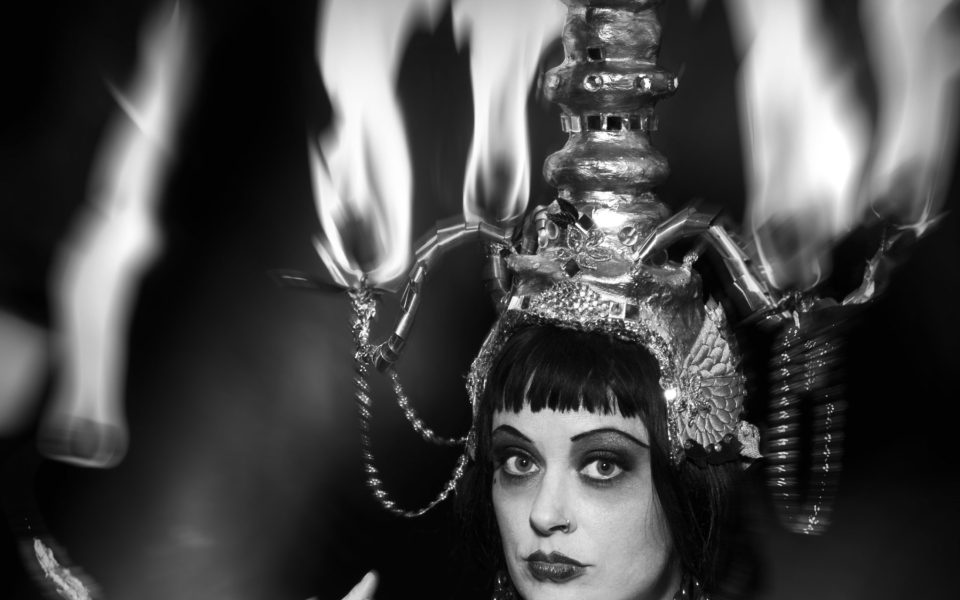Even on lunch break from her day job, in sensible shoes and navy-blue scrubs, Patika Starr is a walking piece of art.
It’s something in the way she carries herself, how her makeup is just a little bit extra for a workday, her vector-perfect eyebrows, the filigreed septum ring that no one else has.
When she’s on stage twirling fire or spinning a hoop, or dancing atop those stilts, the effect is sublime.
But after decades in Greensboro’s live-entertainment avant garde, Patika Starr is trying to become a square, putting the spotlight behind her so she can work at the office full time, have weekends off and concentrate on (gulp) sales.
When the carnival feels mundane, the mundane seems carnivalesque.
“I know, right?” she says. “It will be kind of nice to have a regular schedule, a regular paycheck, insurance.”
To truly realize the absurdity of this turn of events, one must understand that Patika goes all the way back to the first days of the flow arts in Greensboro, its birth in the warehouse rave scene amid new drugs and urban atrophy. She was spinning fire in downtown Greensboro before Babylon’s rave series in the late 1990s, giving blacklight performances as far away as Charlotte, throwing lounge parties at the Exchange on Tate Street when the city was still more like a town, and an underground scene could remain clandestine for a time.
She had been hosting socials at Artistika and providing unusual performance art at events and in spaces all around the Triad when Richard Harris came to see her perform at Much, Joey Medaloni’s new restaurant on South Elm Street in 2004.
Harris was the owner of Castle McCulloch, a genuine castle in Jamestown built in 1832 on grounds still lush with trees and laced with trails, featuring a small, clear lake. He had an idea to host events at the space, which up until then had been mainly used for weddings.
He had no idea what he was in for, Patika says.
In 2005, she helped create the first Castle Carnevale, the event which eventually became a Mardi Gras celebration.
“In the original Carnivals we did elaborate dinners before the shows,” she says. “We had a king and queen. I put together skits and acts for the private dinner. That was crazy because we didn’t have budget to hire a stage manager for me, so I had two simultaneous dinners going on within the castle and the Crystal gardens. I would be running back and forth at top speed between the two places to make sure all the acts were running on time and doing their thing. I really had to hire people I trusted because I could not be at two places at once, but I tried my best to be.”
Now, the castle holds upwards of five events a year, including wedding shows and the Beer & Fear Bash, a Halloween extravaganza. She’s hired hundreds of acrobats, aerialists, drag queens, strippers, hoopists, contortionists, dancers and bands. She created the Freak Parades, judged the costume contests, performed as the Snow Queen at Christmas Castle and has flown across the lake with the fire wings of the phoenix.
And though she will consult on future events, Patika says that part of her professional life is done.
It has, of course, been incredible.
“My favorite part was working with all the talented performers over the years and building those relationships,” she says. “I booked a lot of performers from Charlotte, Raleigh and Virginia…. So many of them became friends over the years and the castle events became like a reunion where we would all reconnect. Then they started collaborating together too. I loved seeing this happen.”
And there were changes in the crowd as well. Costumes were more of a peculiarity at the first Carnevale events, as opposed to the heavily masked Mardi Gras events today. She would see how regular attendees stepped up their costuming game over the years. And she also watched them become more accepting of lifestyles alternate to their own.
“I’ve watched the crowd learn,” she says, “learn to be more open to LGBTQ+ people, learn to become more open-minded and more accepting. I see straight men tipping drag queens now.”
So what now? She’s not quite sure, but like any great performer she trusts her instincts and her training.
“There’s a new Patika evolving,” she says, “and I’m not quite sure who she is yet. But I know I’ve got to let go of some older things to create room for the new.”
Join the First Amendment Society, a membership that goes directly to funding TCB‘s newsroom.
We believe that reporting can save the world.
The TCB First Amendment Society recognizes the vital role of a free, unfettered press with a bundling of local experiences designed to build community, and unique engagements with our newsroom that will help you understand, and shape, local journalism’s critical role in uplifting the people in our cities.
All revenue goes directly into the newsroom as reporters’ salaries and freelance commissions.


Leave a Reply